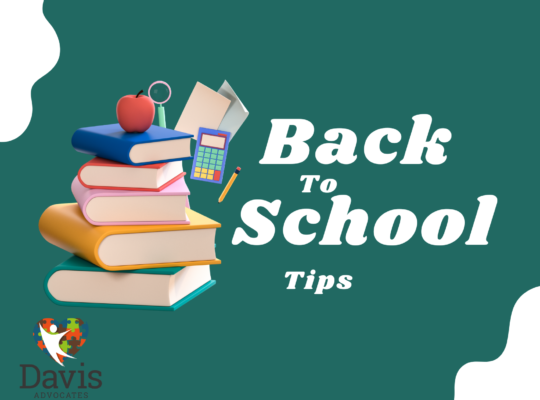As a parent, attending an ARD (IEP) meeting can be an overwhelming experience. The meeting involves a team of professionals who review and discuss your child’s progress, goals, and services for the upcoming year. One way to feel more prepared and in control of the meeting is to create a Parent Agenda which was discussed in my last blog post. A component of the Parent Agenda is a Parent Concerns and Vision Statement.
A Parent Concerns/Vision Statement outlines your goals, concerns, and expectations for your child’s education. It serves as a roadmap for the meeting and ensures that your voice is heard. It also helps you stay focused and organized during the meeting.
Here are some tips on creating a Parent Concerns/Vision Statement:
1. Start by identifying your child’s strengths, weaknesses, and needs. Think about what you want your child to achieve academically, socially, and emotionally.
2. Write down your concerns and questions. Be specific and provide examples. For example, if you are concerned about your child’s reading skills, write down specific questions about the reading program, interventions, and progress monitoring.
3. Consider your child’s accommodations and services. Write down what is working and what is not. Be clear about what additional services or accommodations you would like to see.
4. Think about your role as a parent. Write down how you can support your child’s education and what you expect from the school.
5. Use positive language and focus on your child’s strengths. Your Parent Concerns/Vision Statement should be a collaborative statement that highlights your child’s potential and goals.
Here are three examples of a Parent Concerns/Vision Statement:
Example 1:
Dear ARD Committee,
I am excited to participate in my child’s ARD meeting. I want to work with you to ensure that my child receives the best education possible. Here are some of my goals, concerns, and expectations for the meeting:
1. Strengths, Weaknesses, and Needs: My child is a creative and curious learner who enjoys hands-on activities. However, my child struggles with reading comprehension and written expression. I would like to discuss ways to support my child’s reading and writing skills.
2. Concerns and Questions: I am concerned about my child’s progress in reading and writing. Can you provide more information about the reading program and interventions? How can I support my child’s writing skills at home?
3. Accommodations and Services: My child benefits from small group instruction and visual aids. However, I would like to discuss additional accommodations, such as extended time on tests and assignments.
4. Parental Role: I am committed to supporting my child’s education. I would like to receive regular updates on my child’s progress and collaborate with the school to address any concerns.
Thank you for your time and dedication to my child’s education. I look forward to working with you to create a successful IEP.
Sincerely,
[Your name]
Example 2:
Our vision for Johnny is that he will continue to be placed in a typical inclusive environment with support throughout the next five years. We hope that by the time he turns 13 years old, he will have developed interests and have a couple of friends that he plays with regularly.
We want John to be more independent in the classroom and during unstructured times such as recess and lunch. We want him to be able to develop more peer relationships without adult facilitation. Also, he will be able to develop a better understanding of nonverbal communicators and expand his social language abilities in all settings. We want him to continue to be involved in team sports.
We would like to see John develop at least one area of interest that he is passionate and skilled at (e.g., music or writing), and that will bring his self-esteem up.
We are concerned that Johnny is still struggling with remaining on task in the classroom. We are also concerned with the amount of time he spends each night on homework.
Johnny did not master two of his goals last year and we would like to discuss how we as a committee are going to address these goals and what extra supports and services may need to be put in place to ensure that Johnny can master these goals this year.
You can even list out your child’s needs and a way for the school to meet those needs.
- Johnny needs less homework: Johnny spends several hours a night working on his assignments. His ADHD medication has worn off and he spends a great of deal time being off task. He needs time to be a child. We have attached a Homework Log for your review so that you can see how much time he spends each night on his assignments.
Example 3:
We have the following concerns:
- Communication: We would like to see Jane saying more words and sounds. We want to make sure that Jane can generalize what she is learning in the speech therapist’s room across multiple environments. We would like to see Jane practicing what she has learned with the speech therapist throughout the school day. We would like for all personnel working with her to use the same type of instruction, prompting, and modeling that the speech therapist does to help facilitate the generalization of skills. We would like to see push-in and consultation speech therapy minutes added to Jane’s schedule of services.
We would like to see Jane learn how to use assistive technology and/or augmentative communication devices to help with these communication skills. We are willing to give our written consent for any assessments that will be needed for these services.
- Socialization: We would like to see Jane interacting with her same-age peers not just participating in parallel play.
- We would like to see Jane included in the general education classroom as much as possible. We feel that she will learn both academically and socially through modeling by being around her same-age non-disabled peers.
Remember, your Parent Concerns/Vision Statement should reflect your child’s unique needs and goals. It should be a flexible statement that can be updated and revised as needed. By creating a Parent Concerns/Vision Statement, you can advocate for your child and ensure that their education is tailored to their needs.
If you need assistance in creating your Parent Concerns/Vision Statement or have any questions, do not hesitate to reach out to me.
This post is intended to give you a general idea about special education and preparing for ARD meetings. Samantha Davis cannot predict the outcome of any meetings, including ARD (IEP) meetings that are held for your child. Special education eligibility and/or services that may be offered to your child are based on the decision of the ARD (IEP) committee as a whole.







